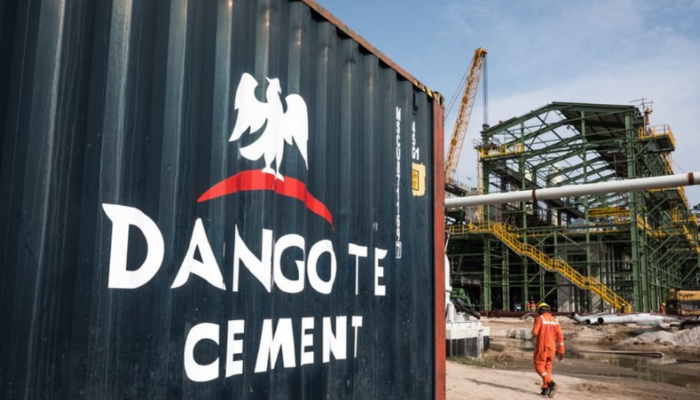Dangote Cement Plc, Africa’s leading cement producer, has disclosed that it has invested more than $8.5 billion across the continent in the last 15 years, underscoring its role as one of the foremost drivers of industrialisation and infrastructure development in Africa.
The announcement highlights the company’s strategic expansion efforts that have not only boosted its production capacity but also created thousands of direct and indirect jobs, enhanced local value chains, and reduced Africa’s dependence on imported cement.

Since 2010, when the company embarked on a continental expansion strategy, Dangote Cement has steadily extended its footprint beyond Nigeria into key markets such as Ghana, Senegal, Ethiopia, Tanzania, Zambia, South Africa, and the Republic of Congo. The multi-billion-dollar investment, according to the firm, has been pivotal in transforming Africa’s cement sector, improving supply chain efficiency, and providing affordable building materials critical for housing, roads, and large infrastructure projects.
The Group Managing Director of Dangote Cement, Arvind Pathak, explained that the company’s investments were guided by a vision to make Africa self-sufficient in cement production. “Our commitment over the past 15 years has been to ensure that Africa is no longer dependent on imported cement. With over $8.5 billion invested, we have delivered new plants, upgraded existing facilities, and supported host communities with employment and development programmes. This has made a significant contribution to the region’s economic growth,” he said.
The expansion has lifted Dangote Cement’s total installed capacity to about 51.6 million metric tonnes per annum (MTPA), making it the single largest producer on the continent. In Nigeria alone, the company operates integrated plants in Obajana, Ibese, and Gboko, with a combined capacity exceeding 35 million MTPA. Outside Nigeria, facilities in Ethiopia, Zambia, and Senegal have become cornerstones of their respective national economies, serving both domestic and export markets.
Over the years, the company’s investments have had far-reaching socio-economic impacts. In addition to creating direct employment for thousands of Africans, Dangote Cement has supported ancillary industries such as haulage, packaging, and energy, creating multiplier effects that stimulate local economies. The firm’s logistics network, one of the largest on the continent, has also facilitated trade across borders, boosting regional integration efforts.
Industry analysts note that Dangote Cement’s investments have been particularly timely, given Africa’s rapid population growth and rising demand for housing and infrastructure. The United Nations projects that Africa’s population will double to 2.5 billion by 2050, a demographic shift that requires accelerated infrastructure development. By expanding local cement production, Dangote has not only reduced reliance on imports but also lowered the foreign exchange burden of many African countries.
The company has also played a role in advancing sustainability goals. Recent investments have increasingly focused on adopting alternative fuels, improving energy efficiency, and reducing carbon emissions. For instance, several Dangote Cement plants are already co-processing agricultural waste and industrial by-products as fuel alternatives, a strategy that reduces reliance on fossil fuels while contributing to environmental sustainability.
Aliko Dangote, President of the Dangote Group, has repeatedly emphasized that the cement company’s continental strategy goes beyond profit. According to him, the investments were motivated by a desire to unlock Africa’s potential by providing the critical infrastructure backbone needed for development. “No economy can thrive without adequate infrastructure. Cement is at the heart of construction, and our mission has always been to make it available, affordable, and locally produced across Africa. The $8.5 billion we have invested reflects our long-term commitment to this vision,” he stated in a recent interview.
The investment has not been without challenges. Currency volatility, high energy costs, insecurity, and regulatory uncertainties have tested the company’s operations in different markets. Nonetheless, Dangote Cement has continued to record strong financial performance, buoyed by resilient demand and strategic cost management. In its latest half-year results, the company reported a rise in revenue and profit, attributing the growth to increased sales volume and efficiency gains.
The firm’s leadership also pointed to the importance of partnerships with governments and communities in sustaining its expansion drive. By aligning with national development agendas, Dangote Cement has been able to secure support for its projects while addressing local concerns through community development initiatives, including healthcare, education, and skills training programmes.
Looking ahead, Dangote Cement plans to consolidate its market leadership and explore new opportunities for expansion in untapped regions of Africa. The company is also expected to intensify investments in cleaner technologies, in line with global climate commitments and investor demand for sustainable practices.
Observers believe that the company’s $8.5 billion investment is a powerful testament to the role of African enterprises in shaping the continent’s future. Rather than waiting for foreign firms to drive industrialisation, Dangote Cement has demonstrated that homegrown companies can mobilise resources, take risks, and create transformative impacts at scale.
For African governments, the lesson is clear: fostering an enabling environment that supports local and regional champions can accelerate development and reduce dependence on imports. For ordinary Africans, the result is more jobs, better housing prospects, and improved infrastructure that underpin inclusive growth.
With the continent still facing huge gaps in housing and infrastructure, Dangote Cement’s 15-year investment journey stands as a milestone in Africa’s industrial story—one that underscores the power of vision, resilience, and commitment to regional self-reliance.
Support InfoStride News' Credible Journalism: Only credible journalism can guarantee a fair, accountable and transparent society, including democracy and government. It involves a lot of efforts and money. We need your support. Click here to Donate
